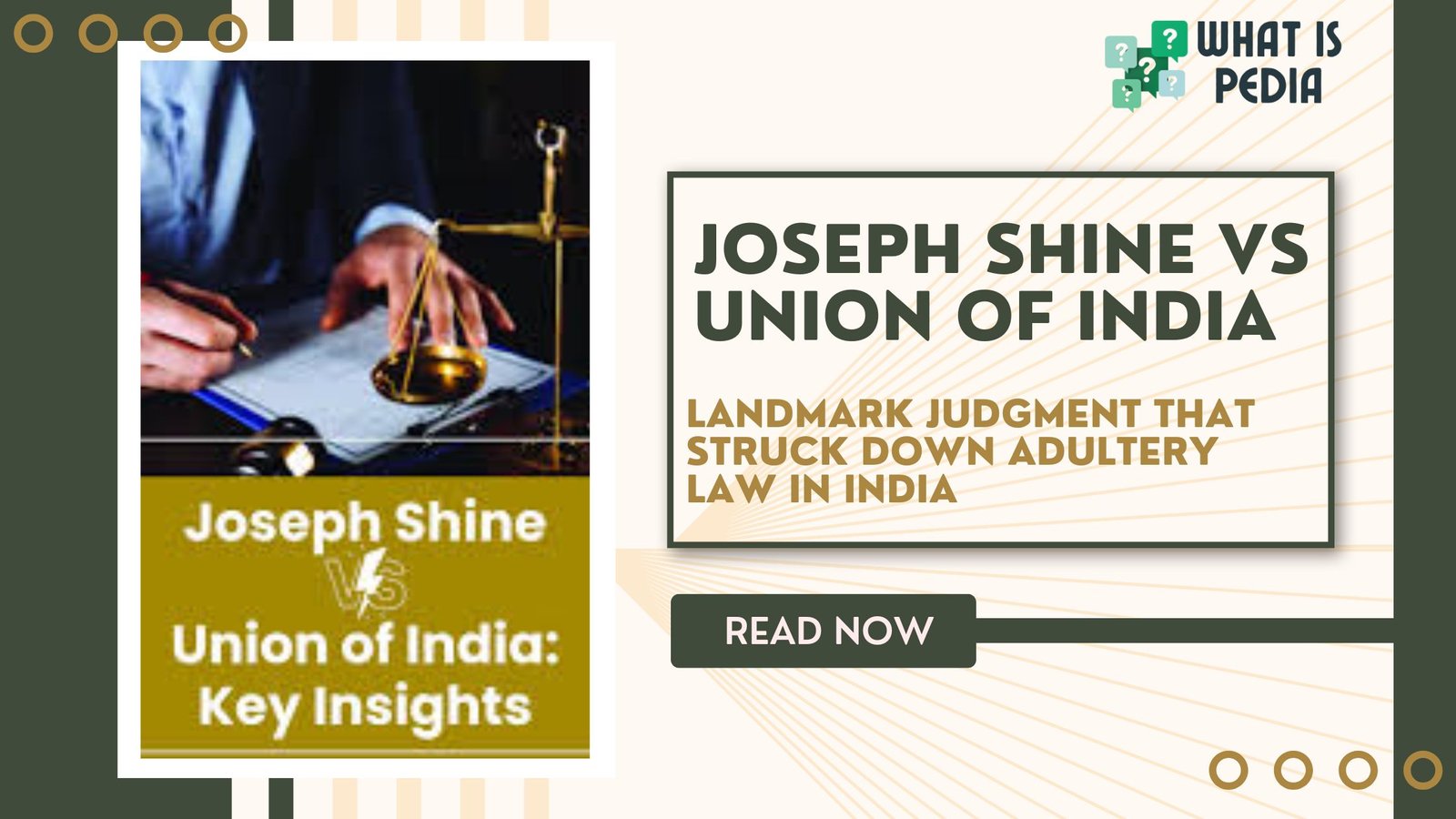1. Introduction
In the annals of Indian legal history, few judgments have sparked as much national debate and introspection as the Joseph Shine vs Union of India case. This landmark ruling in 2018 not only decriminalized adultery but also challenged deep-rooted gender biases and outdated moral assumptions embedded in Indian penal law.
Filed by a non-resident Indian, Joseph Shine, this public interest litigation (PIL) questioned the constitutional validity of Section 497 of the Indian Penal Code (IPC), which criminalized adultery. The Supreme Court’s five-judge bench struck down this section, terming it archaic, patriarchal, and violative of fundamental rights.
For UPSC aspirants and law students, the Joseph Shine case is more than a legal precedent—it’s a gateway to understanding how constitutional morality and individual autonomy intersect with legislation. The case has become an essential reference for topics related to gender justice, personal liberty, and the progressive evolution of Indian jurisprudence.
Keywords: Joseph Shine vs Union of India, Joseph Shine case UPSC
2. Background of the Adultery Law in India
Section 497 of the IPC, introduced in 1860 under British colonial rule, made adultery a criminal offense. It stated that any man who engaged in sexual relations with a married woman without her husband’s consent could be punished with up to five years in prison. However, the woman involved faced no legal consequences.
This provision was criticized for several reasons:
- Gender Bias: It treated women as property of their husbands, denying them agency.
- One-Sided Penalization: Only the man could be prosecuted, not the married woman.
- Violation of Personal Liberty: Criminalizing consensual relationships among adults was seen as an infringement on the right to privacy.
Over time, several legal experts and social commentators argued that Section 497 was not only outdated but also incompatible with a modern understanding of equality and freedom. The Joseph Shine vs UOI case became the turning point in this long-standing debate.
Keywords: Joseph Shine case, Joseph Shine vs UOI
3. Who is Joseph Shine?
Joseph Shine is an Indian-origin hotelier based in Italy. Though not directly affected by the law, he filed a PIL in 2017 under Article 32 of the Indian Constitution, arguing that Section 497 violated fundamental rights.
His motivation stemmed from witnessing how such laws had devastating effects on individuals and families. Shine believed that adultery, being a personal matter, should not be under the purview of criminal law. His initiative was a rare example of a private citizen taking a stand for broader constitutional justice.
His petition was pivotal in initiating a nationwide discussion on gender justice, individual rights, and the role of the state in private relationships.
Keywords: Joseph Shine case, Joseph Shine vs Union of India UPSC
4. Case Timeline and Legal Journey
- 2017: Joseph Shine filed a PIL challenging Section 497 IPC.
- January 2018: A three-judge bench referred the case to a five-judge Constitutional Bench.
- August 2018: The five-judge bench heard the case over several days.
Legal Arguments:
- Petitioner’s Argument: Section 497 was discriminatory and violated Articles 14 (Equality), 15 (Non-discrimination), and 21 (Right to life and personal liberty).
- Union of India’s Stand: The government initially defended the provision, arguing it protected the sanctity of marriage.
- Amicus Curiae: Advocates appointed by the court to assist in the matter highlighted global trends toward decriminalization and the need to respect personal autonomy.
The court also heard from intervenors, including women’s rights organizations and legal scholars, who unanimously supported striking down the provision.
Keywords: Joseph Shine vs UOI, Joseph Shine vs Union of India
5. Constitutional Bench and the Supreme Court Judgment
The Constitutional Bench comprised:
- Chief Justice Dipak Misra
- Justice R. F. Nariman
- Justice A. M. Khanwilkar
- Justice D. Y. Chandrachud
- Justice Indu Malhotra
Key Takeaways from the Judgment:
- Unanimous Verdict: All five judges held that Section 497 was unconstitutional.
- Violation of Article 14: The law was manifestly arbitrary and treated men and women unequally.
- Violation of Article 15: It was discriminatory on the basis of sex.
- Violation of Article 21: The right to privacy and dignity includes freedom in intimate relationships.
Justice Chandrachud’s opinion emphasized that a woman cannot be treated as the “chattel” of her husband. The bench agreed that adultery might be a moral wrong but not a criminal offense.
Keywords: Joseph Shine vs Union of India citation, Joseph Shine case
6. Impact of the Judgment
Decriminalization of Adultery:
The most immediate effect was the removal of criminal penalties for adultery. This placed adultery solely within the realm of civil law, particularly as a ground for divorce.
Promoting Gender Justice:
The judgment was hailed as a step forward in the fight for gender equality, rejecting laws that reinforce patriarchal norms.
Individual Autonomy:
The court reiterated that consensual relationships between adults are beyond the control of the state, aligning with previous judgments like the Right to Privacy (Puttaswamy case) and Section 377 decriminalization.
Public and Legal Reactions:
While most legal experts and civil society welcomed the decision, conservative sections expressed concern about the erosion of marital values.
Keywords: Joseph Shine vs Union of India UPSC, Joseph Shine vs UOI
7. Criticisms and Counterpoints
Despite widespread support, the judgment faced criticisms:
- Undermining Marriage: Critics argued it may weaken the institution of marriage by removing legal deterrents.
- Moral vs Legal Debate: Some believed the court should have retained adultery as a criminal act due to its moral implications.
- Fear of Legal Vacuum: Concerns were raised that the absence of punitive measures could lead to increased infidelity.
Nevertheless, the court maintained that morality cannot be enforced by criminal law.
Keywords: Joseph Shine case UPSC
8. Relevance for UPSC and Legal Exams
This case is a hot topic for UPSC Mains (GS Paper II and IV) as well as law entrance exams like CLAT and judicial services:
Polity and Constitution:
- Understanding constitutional provisions (Articles 14, 15, 21)
- Role of judiciary in progressive interpretation of law
Ethics and Essay:
- Balancing individual liberty vs societal norms
- Role of judiciary in social reform
Possible UPSC Questions:
- “Discuss the significance of the Joseph Shine judgment in advancing gender justice.”
- “Is morality a valid ground for criminal legislation? Analyze with reference to Joseph Shine vs Union of India.”
Keywords: Joseph Shine vs Union of India UPSC, Joseph Shine case UPSC
9. Comparison with International Laws on Adultery
Globally, many countries have moved toward decriminalizing adultery:
- France and UK: Adultery is not a criminal offense
- USA: Laws vary by state, though rarely enforced
- South Korea & Philippines: Still criminalize adultery
India’s move aligns it with democratic countries prioritizing individual rights and privacy over moral policing.
Keywords: Joseph Shine case
10. Conclusion
The Joseph Shine vs Union of India case was a transformative moment in Indian constitutional history. It not only struck down an outdated and discriminatory law but also reaffirmed the ideals of liberty, equality, and dignity.
The judgment serves as a guiding light for future legal reforms rooted in constitutional morality rather than colonial legacies.
Keywords: Joseph Shine vs Union of India
11. FAQs Section
What is the Joseph Shine vs Union of India citation?
Citation: Joseph Shine v. Union of India, (2019) 3 SCC 39.
What was Section 497 IPC?
It criminalized adultery, penalizing a man for having consensual sexual relations with a married woman without her husband’s consent.
Why is Joseph Shine case important for UPSC?
It is relevant for topics like gender justice, individual liberty, fundamental rights, and progressive judicial activism.
What was the verdict in Joseph Shine vs UOI?
The Supreme Court unanimously struck down Section 497 IPC, declaring it unconstitutional and violative of Articles 14, 15, and 21.
Read Previous Blog: Understanding Communal Riots in India: Causes, Laws & Solutions







